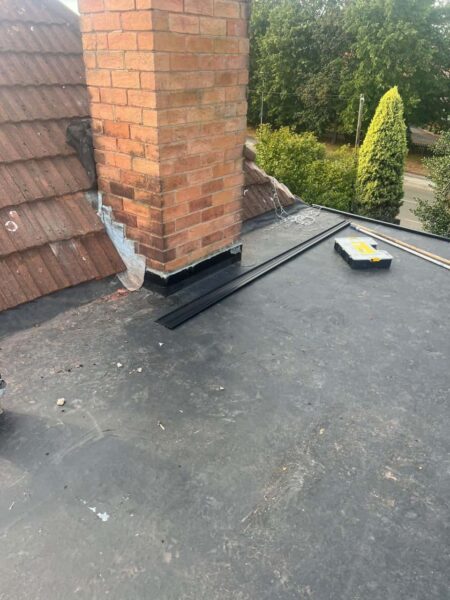When Flat Roof Cracks Appear, What’s the Right Repair Approach?
Flat roofs are a common feature on many residential and commercial properties, offering a practical and modern aesthetic. However, flat roofs can be prone to cracking over time, particularly if they are exposed to harsh weather conditions or have been poorly maintained. At JYT Roofing Hitchin, located in Hitchin, Northamptonshire, we understand the importance of addressing flat roof cracks promptly and professionally to prevent more serious issues from arising. In this blog post, we’ll explore the best approaches to repairing flat roof cracks and how to ensure your roof stays secure and watertight.
What Causes Cracks in Flat Roofs?
Before diving into repair options, it’s essential to understand why cracks appear in flat roofs. Some common causes include:
- Weather Exposure
Flat roofs are particularly vulnerable to the elements, especially when exposed to harsh sunlight, heavy rain, snow, and fluctuating temperatures. Over time, the roofing material can expand and contract, leading to cracks in the surface. - Poor Installation or Materials
If the roof was not installed correctly or low-quality materials were used, it’s more likely that cracks will develop. Poor workmanship or substandard materials can compromise the roof’s ability to withstand wear and tear, making it prone to damage. - Age of the Roof
All roofing materials have a lifespan, and flat roofs are no exception. As the roof ages, it becomes more susceptible to cracking due to the natural deterioration of materials. - Lack of Maintenance
Regular maintenance is key to prolonging the lifespan of a flat roof. Neglecting to clean debris, check drainage systems, or carry out minor repairs can lead to cracks and leaks over time.
The Right Approach to Flat Roof Repairs
When cracks appear on a flat roof, it’s crucial to take the appropriate steps to address the damage before it worsens. Here are the key approaches to repairing flat roof cracks:
- Assess the Extent of the Damage
The first step is a thorough inspection of the roof to determine the size, location, and severity of the cracks. Small cracks can often be repaired easily, while larger or more widespread damage may require more substantial intervention. At JYT Roofing Hitchin, we carry out detailed roof inspections to assess the best course of action, ensuring that all potential issues are identified. - Clean the Area
Before any repair work can begin, the damaged area needs to be cleaned thoroughly. This involves removing any dirt, debris, or loose materials that could interfere with the repair process. Cleaning the surface ensures that the repair materials can adhere properly, leading to a more effective and long-lasting solution. - Choose the Right Repair Method
- Patching Small Cracks
For minor cracks, a simple patching solution may be sufficient. This involves applying a high-quality sealant or patching material over the crack to prevent water from entering. This is a cost-effective solution for small, isolated cracks but must be done carefully to ensure the patch is fully watertight. - Liquid Roofing Systems
For more extensive damage or older roofs, a liquid roofing system can be applied. This involves coating the entire roof with a liquid membrane that hardens to form a seamless, waterproof barrier. Liquid roofing systems are particularly effective for flat roofs, as they provide long-term protection against leaks and cracks. - Re-Roofing for Severe Damage
In cases where the cracks are extensive or the roof has reached the end of its lifespan, re-roofing may be the best option. This involves removing the damaged roofing material and installing a new, durable flat roof. While this is a more substantial repair, it ensures that the roof is fully restored and protected for many years to come.
- Patching Small Cracks
- Ensure Proper Drainage
One of the most common issues that lead to flat roof cracks is poor drainage. Water that pools on the surface of the roof can seep into cracks, causing further damage. As part of the repair process, it’s important to ensure that the drainage system is functioning correctly. This may involve clearing gutters, downpipes, and drains or installing additional drainage solutions to prevent water build-up. - Regular Maintenance and Inspections
After repairing the cracks, ongoing maintenance is key to preventing future damage. Regular inspections and prompt repairs of any minor issues will help prolong the lifespan of the roof and avoid costly repairs down the line.
Conclusion
Flat roof cracks are a common issue, but with the right approach, they can be repaired effectively to prevent further damage. At JYT Roofing Hitchin, we offer expert flat roof repair services that address both minor cracks and more serious structural damage, ensuring your roof remains watertight and durable. Whether you need a simple patch repair or a full re-roofing service, our team is here to help.
Call us on: 01462 418 494
Click here to find out more about JYT Roofing Hitchin
Click here to complete our contact form and see how we can help with roofing needs.

